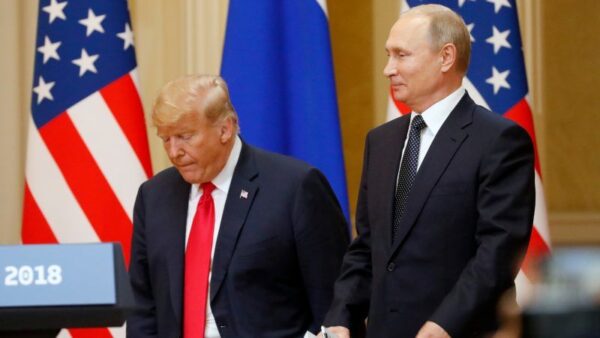An Ex-KGB Agent Says Trump Was a Russian Asset Since 1987 and Russia Has Secret Leverage Over Trump
File photo: Former US President Donald Trump, in a stunning rebuke of the US intelligence community, declined in 2018 in Helsinki to endorse the US government’s assessment that Russia interfered in the 2016 presidential election, saying he doesn’t “see any reason why” Russia would be responsible.“ Trump’s ‘subservience’ to Russian President Vladimir Putin (R) is ‘humiliating’ to the US,” Joe Biden said on August 22, 2020 during his presidential campaign “Never before has an American president played such a subservient role to a Russian leader,” he was quoted as saying.
During the Soviet era, Russian intelligence agencies worked aggressively to gain leverage over prominent foreign figures. Their tactics included luring or entrapping not only high-profile politicians and cultural leaders but also those with potential future influence. This practice has continued well into modern times, targeting people seen as rising stars in politics or business.
In 1986, Soviet Ambassador Yuri Dubinin met Donald Trump in New York, lavishing him with praise for his real estate ventures and proposing a potential building project in Moscow. A year later, in July 1987, Trump visited Moscow, an event that would later be scrutinized as a turning point in his political career.
Upon his return, Trump appeared energized with newfound political ambitions, marking the beginning of his long series of flirtations with the presidency. Just two months after his Moscow trip, Trump spent nearly $100,000 on full-page ads in major U.S. newspapers. These ads weren’t merely business promotions—they were political manifestos.
In an “open letter” to the American public, Trump argued that the United States should stop paying to defend countries that could afford to protect themselves.
He criticized American allies, suggesting that they were exploiting U.S. military protection without offering fair compensation in return.
It was a stark shift in tone, and some, like New York Magazine’s Jonathan Chait, speculate that Russian influence during Trump’s trip may have planted these ideas in his mind, as he had never made such arguments before.
Throughout his political career, Trump has consistently taken positions that align with Russian interests, fueling suspicions about his loyalties.
In 2018, during a meeting with Russian President Vladimir Putin in Helsinki, Trump appeared unusually deferential. He echoed Putin’s talking points on several issues, including the absurd idea of a joint U.S.-Russia cybersecurity unit, raising eyebrows even among his staunchest supporters.
He frequently seemed to alienate U.S. allies and disrupt long-standing international alliances, behavior that many found perplexing and damaging to American interests.
One of Trump’s most controversial moments came when he refused to acknowledge Russia’s wrongdoing in the poisoning of opposition leader Alexei Navalny, an act condemned by much of the international community.
Investigative reporter Craig Unger further inflamed suspicions with his book “American Kompromat,” where a former KGB spy, Yuri Shvets, confirmed that Russian intelligence had been cultivating Trump for decades.
According to Shvets, the KGB successfully manipulated Trump by playing to his ego. “In terms of his personality, the guy is not a complicated cookie,” Shvets said, “his most important characteristics being low intellect coupled with hyperinflated vanity.” This, Shvets argued, made Trump an ideal target for recruitment as a Russian “asset.”
In intelligence terms, being a “Russian asset” doesn’t necessarily mean being a secret agent who actively works on behalf of Russia. It can simply mean being a figure who can be easily manipulated to further a foreign power’s interests.
In Trump’s case, Shvets claims the KGB played a role in shaping Trump’s views on American alliances and encouraged his public critique of U.S. military commitments overseas.
The connections between Trump and Russia have persisted. In 2018, Buzzfeed reported, and Special Counsel Robert Mueller later confirmed, that Russia had dangled a lucrative Moscow building deal in front of Trump during his 2016 campaign. The deal promised Trump hundreds of millions of dollars, with no financial risk on his part.
Mueller testified that this arrangement gave Russia blackmail leverage over Trump, which raised further questions about his behavior in office.

Former president Donald Trump is shown with his wife Melania and ex-wife Ivana. Both of them were reportedly communists. Ivana was under FBI investigation for years during her marriage to Trump over ties to her communist home country, Czechoslovakia. Melania’s father was a card-carrying member of the Sevnica Communist Party and spent many nights at the White House during Trump’s presidency. For this reason, many think that Trump is a communist at heart and this is why he is so subservient to Russian President Vladimir Putin . Putin, the former KGB chief also reportedly remains a communist at heart
Further complicating matters is Trump’s family history. His first wife, Ivana, was from the communist bloc nation of Czechoslovakia, and she was under FBI investigation for her ties to her homeland during their marriage. Meanwhile, Trump’s current wife, Melania, hails from Slovenia, and her father was a card-carrying member of the Sevnica Communist Party. Both women’s connections to communist regimes have only added fuel to the fire of speculation about Trump’s ties to Russia.
Some now argue that Trump is a communist at heart, or at the very least, deeply influenced by his personal and business connections to communism.
His relationship with Putin, a former KGB chief who still holds many of the ideals of Soviet communism, has been the subject of constant speculation.
As Americans consider the potential consequences of another Trump presidency, the question arises: If Trump is re-elected, will Putin’s influence over him intensify, potentially jeopardizing America’s alliances and global standing?
As an American voter, the possibility of a second Trump term raises serious concerns. If Trump returns to power, how much influence will Russia exert, and what will become of America’s key alliances in a world where Putin looms large over the White House? The stakes couldn’t be higher.


Leave a Reply
You must be logged in to post a comment.